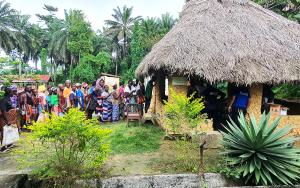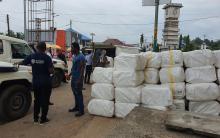Sierra Leone's Nationwide ITN Distribution Campaign Successfully Launched
Malaria remains a significant public health challenge in Sierra Leone, causing illness and deaths, particularly among vulnerable populations such as children under five and pregnant women. Effective measures, such as the mass distribution of ITNs, are crucial to reduce the incidence of malaria and its associated morbidity and mortality.
The burden of malaria disproportionately affects low-income and rural communities in Sierra Leone. By distributing ITNs nationwide, the campaign aimed to protect millions of people from malaria, improving health outcomes and reducing the burden on the healthcare system.
After the successful pilot phase in Bo District in 2023, the MoH, with support from WHO and other partners, launched a nationwide rollout of ITNs in the remaining 15 districts. To ensure quality assurance, 93 independent monitors were trained by WHO technical officers, the CRS ICT4D Team, and the National Malaria Program – MoH in Freetown. These monitors were tasked with assessing and monitoring the registration and distribution processes, as well as community awareness levels regarding the campaign.
Household registration took place from February 1-10, 204, with ITN distribution following on February 22, 2024. During the campaign, 1,936,592 households were registered, and 2,123,334 distributors were involved in the distribution process. A total of 4,835,294 vouchers were distributed, accounting for 102.88% of the expected amount. This high level of voucher distribution ensured that 4,459,591 nets were distributed across the country, accounting for 92.23% of bed nets.
The WHO was instrumental in supporting the ITN distribution campaign in Sierra Leone by providing technical guidance, training independent monitors, and collaborating with other partners to ensure a coordinated and efficient campaign. WHO's involvement helped ensure that the campaign met international standards and achieved its objectives.
The nationwide ITN distribution campaign in Sierra Leone successfully reached millions of households, providing essential protection against malaria. The high distribution rate of vouchers and bed nets demonstrated the campaign's effectiveness in reaching targeted populations.
By implementing this comprehensive approach to combat malaria, Sierra Leone has taken significant steps towards improving public health and reducing the burden of malaria on its population. Continued monitoring and evaluation of the campaign will be essential to assess its long-term impact and guide future initiatives.
The WHO remains committed to supporting Sierra Leone in its efforts to combat malaria and other public health challenges, working towards a healthier future for all.





